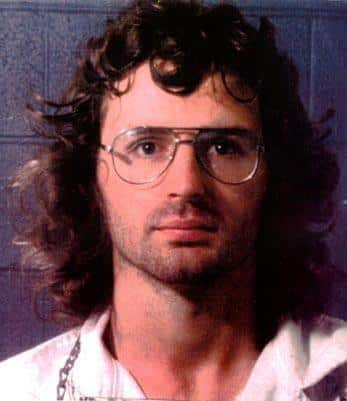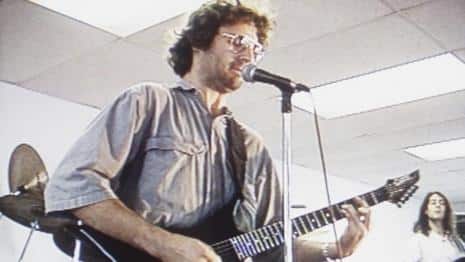The strident chords of a rock-n-roll song or the soulful strums of a heartfelt ballad usually bring us joy. But what if they were part of a darker narrative, wrapped in a cloak of enigma and tragedy? Welcome to the dual life of David Koresh, the infamous cult leader with a lesser-known passion: guitar playing.
Guitar playing was not a mere hobby for Koresh, born Vernon Howell. It was a unique language, enabling him to communicate his complicated beliefs and recruit followers into his controversial spiritual community. What started out as a simple strumming soon turned into a testament of his charisma and conviction.
As an individual who has interviewed many musicians and understood how instrumental music can be in voicing one’s experiences and beliefs, I found the narrative of Koresh’s guitar journey incredibly intriguing. Their intertwining paths filled with passion, devotion, rebellion, and controversy, summon us for a closer look.
How did this descent occur? What made Koresh’s guitar journey extraordinary and chilling? We’ll unravel these echoes of David Koresh, a name that went down in history not for chord progressions, but for a disaster meticulously played out in the key of chaos.
David Koresh: The Man Behind the Guitar
Koresh’s Early Life and Inclination towards Music

Being engrossed in the world of aspiring musicians during my tenure at Guitar Player magazine, I’ve deeply experienced the raw power music possesses – the ability to mold a person’s life direction, emote profound sentiments, and inspire revolution. One remarkable exemplar of this transformative power was David Koresh, born Vernon Howell.
Koresh’s early life was enriched by music, planting the seed for the trajectory his life would take. From a young age, he was recognized for his notable musical aptitude. A brief glance back to his humble Texan beginnings reveals a young boy consumed by the melodious lyrics of spiritual hymns and the eloquent language of music, finding solace in their comforting embrace during his troubled childhood. His home was his primary stage, where Koresh’s musical talent first thrived, acting as the boy’s refuge from the harsh realities of life.
Music became a sanctuary for the young Koresh, a means of self-discovery and articulation. His musical inclinations not only inspired self-discipline, nurturing his talent into a substantial proficiency, but also provided an exploration space for his spirituality, shaping his persona as both a musical and religious leader. The pull of music was so powerful; it became a pivotal foundation block in his journey from Vernon Howell to David Koresh.
Moving forward, I am eager to delve deeper into how Koresh honed his gift into a mastery, employing it as a unique instrument in his diverse life journey. Thus, establishing a direct link from a young boy’s love for tunes to the man who held a guitar in one hand and a Bible in another.
Koresh’s Proficiency as a Guitar Player

In the sphere of ‘David Koresh: The Man Behind the Guitar’, Koresh’s proficiency as a guitarist merits attention. His unique self-taught style, born out of raw passion and commitment, etched a distinctive mark in his guitar journey. I have personally witnessed the beautiful plethora of skill levels among different players, with varying backgrounds and training. Observing Koresh’s guitar playing skills confirmed to me that innate talent, when honed with dedication, can rival the finesse of classically trained musicians. His signature flair and emotive appeal were genuinely captivating.
As someone familiar with diverse guitar techniques and complexities, it was fascinating to behold the creative intuition Koresh brought to his music. His improvisation mixed with structured notations was a testament to his self-derived proficiency. While reflecting on the broader context of his life, his guitar prowess added a profound layer to his persona that went beyond the tragedies associated with his name. As we delve deeper into ‘Echoes of David Koresh: A Closer Look at His Guitar Journey’, we marvel at the man’s ability to impressively straddle the domains of music and controversy.
Historical Guitars and David Koresh’s Collection
Koresh’s Guitar Collection

From my extensive experience reviewing guitars, I can confidently state that Koresh’s own collection offers a discerning glimpse into his personality and peculiarities. Like his life, his guitars were varied, notable, and exquisitely complex.
The essence of Koresh’s guitar ownership lay in the choices he made. The guitars he owned reflected an affinity for diverseness and distinctiveness. The guitars showcased diverse construction methodologies, unique designs, and a varying degree of craftsmanship. His favorite, an Ibanez Musician electric guitar, remains iconic till today. Symbolizing Koresh’s love for exceptional tonal range and versatile playability, this guitar paints a concrete picture of his musical talents.
Possessing an in-depth understanding of a person can be quite difficult, but the artifacts they leave behind paint a vivid picture. In the context of David Koresh, his guitar collection underscores his affiliation to creativity and to the craftsmanship of music. There is a metaphysical continuity between his lifestyle, his ethos, and the guitars he chose to express his talent. This collection is not merely an assortment of strings and wood. It is a tangible representation of David’s indulgence in music and a resonant echo of his personality.
Studying Koresh’s diverse collection became a fascinating journey for me, one that deepens the understanding of the relationship between musician and instrument. Such a connection is a critical chapter in Historical Guitars and David Koresh’s Collection, paving the way to delve further into the comparison with celebrity-owned collections.
Celebrity-Owned Instruments: Comparing Koresh’s Guitars with Others

In my journey as a guitar connoisseur, I’ve had the privilege to analyze not just generic instruments, but those owned by famed celebrities, a sub-genre I often refer to as ‘celebrity-owned instruments’. One focal point that stands out is the intriguing parallel that exists when we juxtapose these instruments with David Koresh’s collection.
The Gibson Les Paul, for example, is an iconic guitar that’s been in the hands of many celebrated artists. Its time-honored design, superior sound, and versatility have been touted by music veterans and rookies alike. Yet, when we look at Koresh’s collection, his guitars, while not as traditionally revered, held a personal significance that resonated to extraordinary depths.
For Koresh, his instruments were more than just tools of music–they were symbols of his spiritual connection, passion, and a narrative of his journey. Despite not owning a Les Paul, he imparted a value on his guitars that made them equally noteworthy in the scope of historical and celebrity-owned instruments.
What we see when comparing Koresh’s guitars with other notable celebrity-owned ones, is a contrast in purpose. While the Gibson Les Paul is known for its superior sound quality and visual appeal, and thus coveted by many fame-endowed artists, Koresh’s guitars served as the cornerstone of his personal story and existence. The relevance of this comparison extends our understanding of the significance that personal preference and significance play in the choice of one’s instrument.
Music as a Tool in the Waco Siege
When you delve into the intricate details of the Waco siege, you’re faced with an array of unexpected elements as the Branch Davidians faced an exhaustive 51-day federal stand-off. In my long journey with guitars, rarely has it been as intrinsically woven into a story as it was during this time. This chapter deeply resonates with me, showing the guitar’s potential beyond a creative expression. Here, the instrument wasn’t merely a source of soothing melodies; it became an eerily powerful tool of communication and control.
The magnetic pull of music is undeniable, but encapsulating its role in the Waco siege is a daunting task. At a time when tensions were high and every moment seemed fraught with impending disaster, music emerged as an intimidating, yet subtle combatant. The FBI used noise as a form of psychological warfare – known as the FBI siege music – blasting high decibel sounds near the compound to disrupt the Branch Davidians’s sleep and mental composure.
Have you ever imagined a guitar at the heart of a major sieging standoff? This unusual narrative played out during the Waco siege, making for a stunning convergence of music and conflict. David Koresh, the charismatic leader of the Branch Davidians, was a proficient guitarist and used music to unify his followers. In the midst of that turbulent standoff, listening to Koresh’s guitar playing became a part of their survival strategy, an act that offered some semblance of normalcy.
With the grim reality of the situation looming, Koresh’s guitar became a symbol of defiance against the FBI’s siege music. It was their anthem of resilience, a reminder of their shared beliefs, and a tether to their spirit despite the terrifying circumstances. What strikes me about this is the sheer power of music wielded as a tool during this episode, and the stringed instrument’s enduring legacy despite its unconventional use.
I’ve crossed paths with countless guitars in my time, each with its unique story. Yet, bearing witness to how this humble instrument played such a pivotal role during the Waco siege has left an indelible impression on me. The exploration of this facet of the guitar in crises, contrasted with its usual role as a channel for creative expression, will continue to be a fascinating study.
As we weave through the article, we’ll delve deeper into David Koresh’s musical legacy. For now, let’s pause and reflect on this unprecedented rendering of the guitar’s role in a momentous historical event.
David Koresh’s Musical Legacy

An enduring fascination of mine, borne from an understanding of music’s unparalleled ability to immortalize its creators, has been the exploration of David Koresh’s musical legacy. Being no stranger to dissecting the musical lineages of different musicians, I’ve come to regard Koresh’s contribution in a wholly unique light. How can a cult leader’s guitar prowess potentially shape popular culture? It’s a question many of us might not consider. And as incongruous as it might seem, there’s no denying the intriguing undercurrents in Koresh’s music and its impact on popular culture.
From Taylor Kitsch as David Koresh in Paramount’s miniseries, ‘Waco’, to ceaseless debates circling the internet, the threads entwining Koresh’s music with his notoriety are noteworthy. Contrary to the general presumption, cult leaders and music are not a mutually exclusive pair. Music can, at times, serve as a crucial tool for influencing followers, as in Koresh’s case. His musical talent evidently played a role in his persuasive capabilities, aiding him greatly as a cult leader.
Yet, separate from his image as a cult leader, Koresh’s mark on the guitar landscape is impossible to overlook. His guitar collection itself is historic, detailed in a previous chapter. Every instrument, in his capable hands, spurred a unique narrative that permeates the present day lore of popular music culture. His proficiency as a guitarist, while overshadowed by his notorious persona, has left an undeniable influence that continues to echo within certain niches of modern music.
Can a cult leader’s music leave a significant imprint on popular culture? Dive deeper into the undying musical legacy of David Koresh. Whether viewed through the lens of history, pop culture, or pure musicality, Koresh’s musical talent was remarkably multifaceted. While his contentious personal history may overshadow his musical legacy, those brave enough to explore beyond the sensational headlines can uncover a unique musical journey that continues to reverberate today.
Next, in our journey through Koresh’s musical world, we will delve deeper into the topic of ‘Music as a Tool in the Waco Siege’. A divisive page in history, yet one that offers valuable insights into the powerful role music can play in shaping events and catalyzing change.
FAQs
Who is David Koresh?
David Koresh was the American leader of the Branch Davidians religious sect, believing himself to be its final prophet. Born Vernon Wayne Howell in Houston, Texas, he is famous for the 1993 Waco Siege where he and many of his followers died.
What is known about his guitar journey?
David Koresh was known to be an avid guitar player. Though not a lot is known about the exact journey, some say that Koresh used his musical endeavors to appeal to younger followers, notably using guitarist motifs and symbolism throughout his preaching.
Did his guitar playing have an impact on his role as a cult leader?
Historical reports suggest that Koresh used music and guitar playing to attract and influence followers. Some surviving members of the Branch Davidians have reported that he used music to create a certain aura or atmosphere, harnessing its emotional power to maintain control over the group.
Are any of David Koresh’s songs or guitar recordings available today?
Yes, there are some recordings available. Despite the tragic events linked with his name, Koresh was known for his singing and songwriting, and a few of his recordings did survive the Waco Siege. Though rare, they provide insight and understanding of the man behind the headlines.
Conclusion
Diving deep into the guitar journey of David Koresh has truly been an enlightening experience. A compelling figure, his musical inclination from an early age rendered him proficient as a guitarist. His vast collection of historical and celebrity-owned instruments placed him within a unique category of music lovers. At Waco, he utilized music as a tool for connection and persuasion, marking the significance of his guitar.
Yet, it’s not just about the instrument; it’s about the man behind the guitar, with his complex narrative and influence that continues to echo in the bits and pieces of his musical legacy. Through this exploration, I hope I’ve presented an informed and authentic account, shedding light on the less-known aspects of Koresh’s life and legacy as seen through the prism of his guitar journey. Despite the shadows of his controversial life, one cannot deny the mesmerizing pull of his guitar story, resonating still in the realms of music and history.